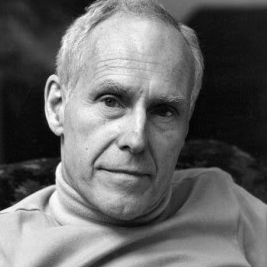Life Time Achievement Award Speech for Barney Rosset
The National Book Critics Circle
Introductory Remarks Delivered in New York City, March 12, 2001 by Steve Wasserman, Book Editor, Los Angeles Times
I have never met the man we honor tonight. But, like so many of you, I feel I know him. And I know him in the best way possible: Through the intimate encounter with the authors he discovered, nurtured, and brilliantly published over the past fifty years: Samuel Beckett, Jorge Luis Borges, Jean Genet, Eugene Ionesco, D.H. Lawrence, Henry Miller, Alain Robbe-Grillet, Marguerite Duras, William Burroughs, Harold Pinter, Che Guevara, Tom Stoppard, Malcolm X, Frantz Fanon, Donald Keene on Japanese literature, Eric Bentley’s translations of Bertolt Brecht.
There is little doubt that when the history of twentieth-century publishing is written, his contribution looms large. Indeed, his literary and political proclivities both reflected and helped to define an historical era.
Nor should it be forgotten that his mischievous disposition was of a kind to confound and deny puritans and philistines of every stripe. Against all odds, and with daring and courage and tenacity, steadfastly opposed censorship and yahoos of every stripe. His libertarian—and indeed libertine—attitude toward sex was as refreshing as it was rare, even as it was discomforting, for some. It was subversive in an immediate postwar period given to the Cold War mores of a country and a citizenry still constrained by silence and hypocrisy. He fought and won legal and literary battles that enlarged the arena of free expression and publication.
And, to speak personally for a moment, I can say that I shall forever be grateful to him for enriching what might well have been an otherwise impoverished adolescence. I vividly remember discovering at age fourteen in a San Francisco bookstore that stupendous avalanche of Victorian erotica, “My Secret Life,” in which I was delightfully exposed to a series of sexual escapades, which in their number and sheer physical complexity, staggered the imagination.
What counted most for this buccaneering publisher was less the number of dollars in the bank, than the number of stars on his forehead. Possessed of unruly curiosities, profound respect for underdogs, a moral preference favoring have-nots over haves, he performed over five decades a kind of miracle: publishing new voices, scandalous voices, repressed voices. A taboo-breaker, fervent and even fevered in his passions and literary instincts, and utterly loyal to his writers, he acted as midwife to the birth of books that would, taken together, stand as a rebuke to the stodginess of received opinion, and a permanent challenge to the orthodoxies of the cultural and political establishment. He provided an engaged and engaging home to misfits of genius, and emboldened a generation of readers to turn themselves inside out and see the world with new eyes.
He was blessed with no gift for publishing strategy but, what was more important, a sensibility: naughty, rebellious, blasphemous, heretical. Moreover, like all good publishers he had an instinct for gifted editors and co-conspirators: Don Allen, Richard Seaver, Fred Jordan, Harry Braverman, Gilbert Sorrentino, Nat Sobel, Kent Carroll, Morrie Goldfisher, Jules Geller, Marilyn Meeker, and Roy Kuhlman, his incomparable designer.
Mere facts don’t do justice to the man and his accomplishments. Especially in a corporate age which prizes docility over defiance, he stood for what has always been exemplary in publishing.
For the founding of Grove Press in 1951, the creation of Evergreen Review, among other inspired entrepreneurial efforts, that have immeasurably enriched the republic of letters, the National Book Critics Circle counts it a high honor and privilege to bestow, with gratitude and heartfelt thanks, the Ivan Sandroff Award for Lifetime Achievement to Barney Rosset.
A Tribute to Barney Rosset
He’s not physically imposing; in fact, you might say he’s a little guy. But Barney Rosset is possessed of a certain palpable energy that you can’s help but he impressed by. In his home or office, wherever he is, he won’t be found sitting still. His hands are rough and weathered, those of a day laborer, not the soft appendages of an office-bound pen pusher. He’s forever scuttering around, moving a bookcase, ripping up tile, planting bushes: rearranging his environment.
And although no one asked him to do it, to a large degree Barney Rosset rearranged the cultural environment for all of America in the 1950s and ’60s. Barney’s publishing model is—well, other than his opinions, he has no model. He gave us Waiting for Godot and The Story of O, The Diaries of Ché Guevara and Games People Play, Naked Lunch and Barbarella, The Wretched of the Earth and The Subterraneans. He has done what he felt like doing, and petty things like laws, cultural mores, and finances could not stop him. Under his direction, the Grove empire—comprised, in the early 1960s, of several hundred employees, an office building, a movie-distribution business, a book club, a magazine, a bar, and of course a book publisher—brought an unprecedented vigor to American publishing, traditionally the preserve of a tweedy elite.
In some way, Barney was the great American cultural impresario of the postwar era, although the figure that comes to mind is less that of Orson Welles than Genghis Khan. Our bespectacled, compact, and even tidy Genghis was the champion of what was once known as “the underground,” and he was as eager to slaughter his foes—real or perceived—as any bloodthirsty Mongol from the steppes. Foes there were many: the F.B.I., the U.S. Post Office, Cuban exiles, feminists, union activists, and other publishers.
Whether they knew it or not, hipsters everywhere were under his sway. And some of us with soft hands, eager to join Barney’s legions in battle, could never shake his influence. Certainly I credit—or blame—him for my foray into independent publishing, which began when I was a twenty-four-year-old editor at Grove. He made publishing a romantic endeavor, and I thank him for it.
We are grateful for his legacy, which lives on in Grove Press 2001.
—John G.H. Oakes, Publisher, Four Walls Eight Windows, New York







